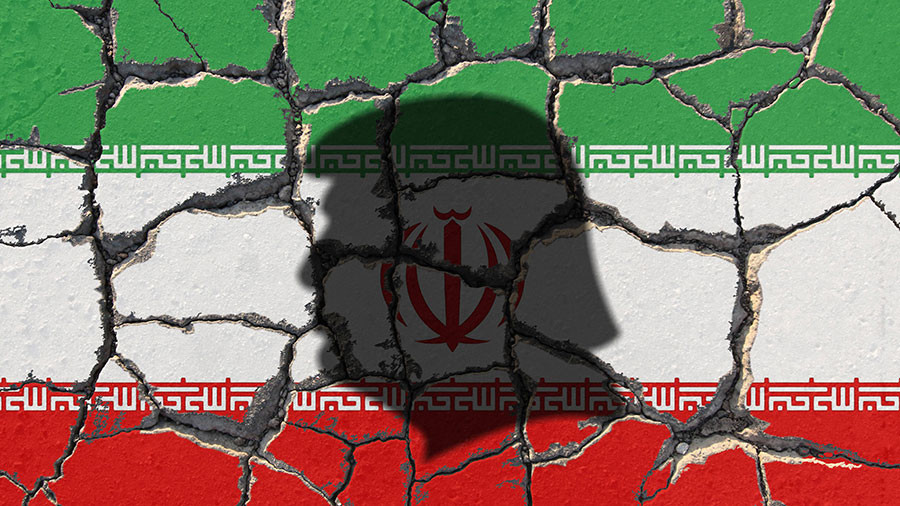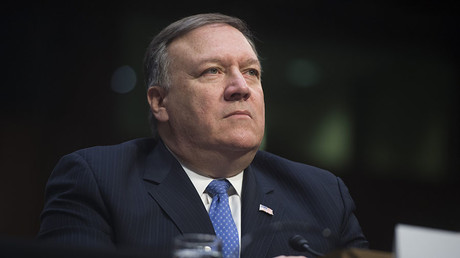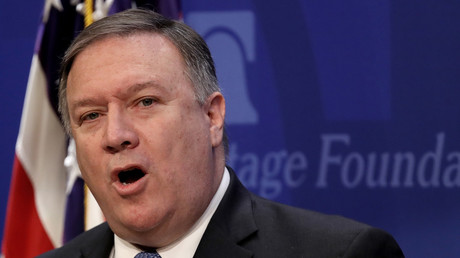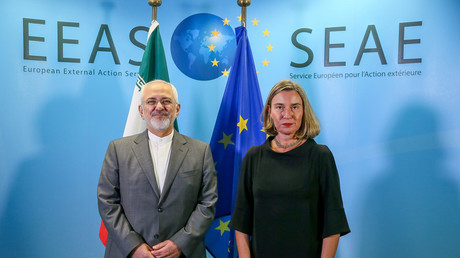Iran in the crosshairs as the Empire enters its mad dog days
John Wight has written for newspapers and websites across the world, including the Independent, Morning Star, Huffington Post, Counterpunch, London Progressive Journal, and Foreign Policy Journal. He is also a regular commentator on RT and BBC Radio. John is currently working on a book exploring the role of the West in the Arab Spring. You can follow him on Twitter @JohnWight1

Mike Pompeo’s bellicose rhetoric against Tehran leaves no doubt that Washington has embraced the status of international renegade.
Pompeo’s speech, delivered in his capacity as secretary of state, evinced a blatant disregard for the integrity of international treaties and respect for international law. It also ensures that the last vestiges of credibility enjoyed by the US has now been shredded in the eyes of a world grown weary – weary of a Trump administration which, in its caprice and continual threats, is more redolent of a New York mafia crime family than a respectable and responsible government.
With Donald Trump’s withdrawal from the Joint Comprehensive Plan of Action (JCPOA) – better known as the Iran nuclear deal – his administration has embarked on the path of conflict with Iran in conjunction with regional allies Israel and Saudi Arabia. Together they comprise an axis of aggression that imperils the stability of the region, with potentially grave consequences for the rest of the world given the succour such a regional conflict would give to extremism and global terrorism.
It also sets a dangerous precedent when it comes to arriving at a peaceful resolution to the on-going crisis in Ukraine and ensuring a successful outcome to the inchoate process of peace and reconciliation on the Korean Peninsula.
The Empire enters its mad dog days
Thus the dire consequences of the untrammelled power of what is an imperial hegemon in Washington have never been more manifest, with its drive to dominate and dictate on pain of war reflective of an empire desperate to arrest a decline, entering its mad dog days in the process.
Let us be clear: the Trump administration’s decision to withdraw from the JCPOA has nothing to do with Iran’s compliance, which has been impeccable, and everything to do with Washington’s hegemonic agenda towards the region – a hegemonic agenda which precedes Trump.
In the way of this agenda are Iran, Syria and Hezbollah – along with Russia – which, if not on a formal basis certainly on a de facto basis, comprise an axis of anti-hegemony that needs to be broken. It is for this and no other reason that Trump, Netanyahu, and bin Salman are intent on forcing the issue with Iran, regardless of the likely catastrophic results.
They have lost in Syria, where the drive to topple the Assad government has been thwarted thanks in no small part to Russia, Iran, and Hezbollah – standing with the Syrian people and Syrian Arab Army – and in response they are intent on settling accounts.
Whither the transatlantic alliance
Another casualty of Trump’s demarche against Iran is the transatlantic alliance between Washington and its various European allies, considered by its proponents to be the unbreakable and irreplaceable fulcrum of democracy in our time.
The insouciance with which the Trump administration has been willing to disregard the stance of France, Germany and the UK on the Iran deal is revelatory; proof-positive that rather than any kind of alliance between friends and partners, the true nature of the America’s relationship to Europe and the EU is akin to the one that existed between Rome and its various satellites and client states during the halcyon days of another empire – which made the mistake of believing its power and existence was eternal.
This particular aspect of the crisis, involving the prospect of US sanctions being levelled not only against Iran but also British, French and German companies operating in Iran, is reflective of the extent to which neocon nostrums are in the driving seat of US foreign policy, with any lingering façade of propriety dropped in favor of raw imperialism.
Now more than ever the wheels have come off Europe’s slavish attachment to the supposed virtues of unipolarity, with the likes of Emmanuel Macron – the very embodiment of a confected liberal centrist, a leader for whom the word ‘opportunism’ was invented – left dangling like the proverbial flunkey after being kicked to the kerb by his lord and master.
The grievous reality of Europe’s hideous lack of independence from Washington – independence of the type that once minded Charles De Gaulle to declaim, “Yes, it is Europe, from the Atlantic to the Urals, it is Europe, it is the whole of Europe, that will decide the fate of the world” – has been laid bare. It presents Europe with a test. Does it wilt in the face of the Trump administration’s imperial arrogance and bellicosity? Or does it awaken and emerge, finally, from beneath Washington’s feet to play a positive and progressive role in world affairs?
Here it is hard to imagine leaders of the questionable calibre of Theresa May and Emmanuel Macron existing anywhere else other than beneath the feet of Washington, with Macron’s earlier boast of wielding influence over Trump when it comes to Syria now returning to haunt him. The reality is that French President Emmanuel Macron carries about as much weight in Washington as a fly’s wing.
Europe’s choice – unipolarity or multipolarity
Crisis is opportunity, they tell us, and this particular crisis presents the opportunity for a new alignment in Europe, forged on the understanding that the destabilizing factor in Europe is not and has never been Russia; that it is and has always been the United States. Economically, culturally, and politically, Europe’s identity has been progressively subsumed into a US identity, with its regressive and shallow paean to the cult of the individual, unfettered capitalism, and might is right.
Therefore the choice Europe faces is clear. It can either remain tethered to the mast of the sinking ship of unipolarity, or it can join Russia, China and the rest of the world in shaping a multipolar alternative, rooted not in the caprice of a president in Washington but instead in the principles set out in the UN Charter – specifically respect for national sovereignty and international law.
Returning to Iran, which now finds itself firmly in the crosshairs of regime change for no other reason that it refuses to bow to the writ of Washington, there is no longer any hiding place when it comes to taking sides. If those countries threatened by this eruption of US aggression do not hang together they will hang separately.
Hegemony demands its response in the shape of anti-hegemony. The future of generations as yet unborn depends on nothing less.




0 Comments:
Post a Comment
Subscribe to Post Comments [Atom]
<< Home